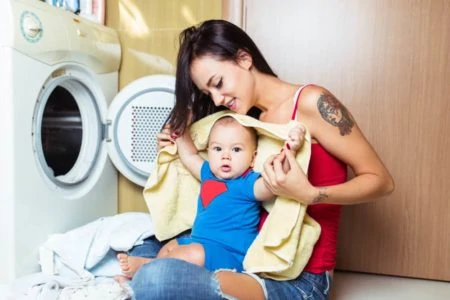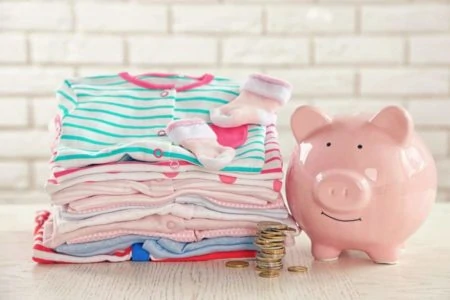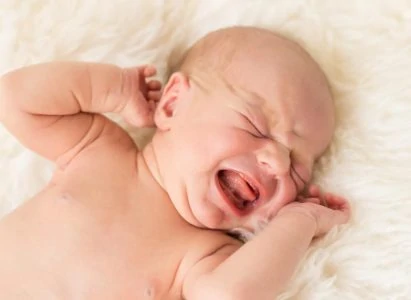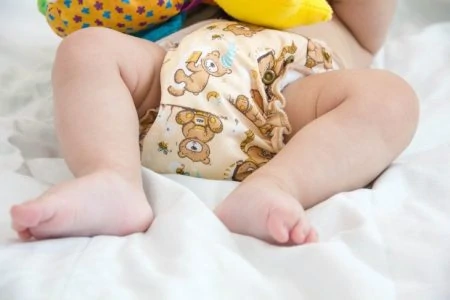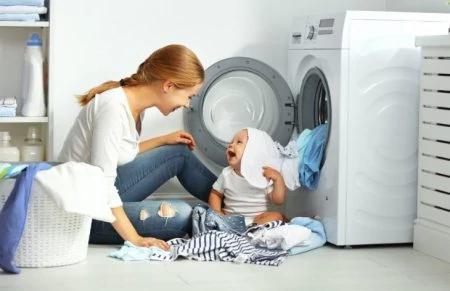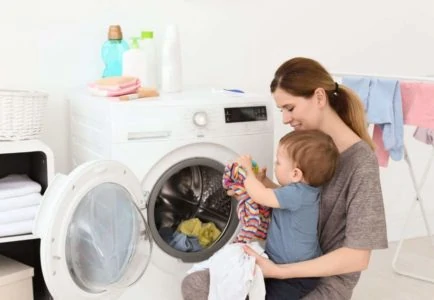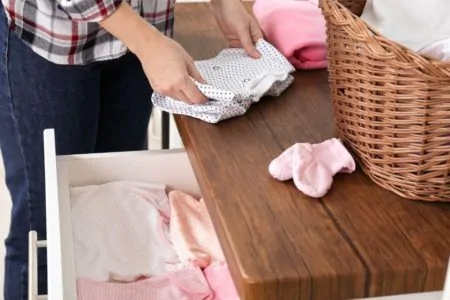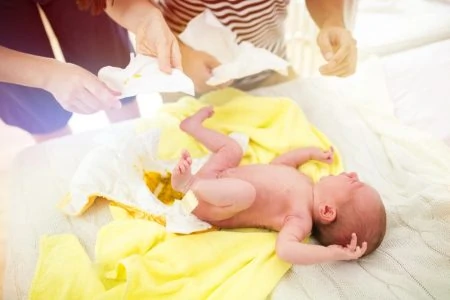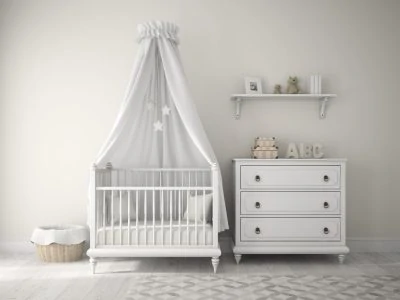New parents often panic about laundry. It feels like a complicated, never-ending mountain of onesies and burp cloths. But washing your newborn’s clothes isn’t as tough as you might think.
We have done more baby laundry over the years than we care to admit. Through trial and error, we learned how to scale the process down to get clothing sparkling clean with minimal effort.
Here is our step-by-step process on how to wash baby clothes efficiently. We will also share our favorite laundry hacks so you can stop stressing about wash day and get back to snuggling that new bundle of joy.
Key Takeaways
- Select a fragrance-free detergent to prevent irritating sensitive newborn skin.
- Wash baby items with the rest of the household laundry to save time, unless specific allergies exist.
- Always wash new clothes before the first wear to remove manufacturing dust and chemicals.
- Pre-treat protein stains like poop and spit-up immediately with cold water before washing.
Choosing a Detergent
Before you start the machine, you need the right detergent.
There are countless brands on the shelf, but we recommend sticking to fragrance-free options. Babies can be sensitive to the chemicals used in scented products (1). You want to clean their clothes, not irritate their skin.
It may seem obvious, but it is best to wash any new clothes before your baby wears them. In clinical practice, I have seen several infants who wore an unwashed new outfit gifted by a family member, only to develop a rash after wearing it (2).
Editor's Note:
Dr. Leah Alexander, MD, FAAPMany parents choose to make their own detergent. It is often cheaper than buying specialized baby soaps, and you have total control over the ingredients.
You can find plenty of simple recipes online. Most require just a few ingredients and are quick to mix. However, always check with your pediatrician before using a new recipe. Be cautious with essential oils; avoid tea tree and lavender oils due to potential estrogenic effects (3).
Whether you buy a bottle or make your own, store it on a high shelf. Keep all cleaning products well out of the reach of tiny fingers (4).
Combined vs. Baby-Only Loads
Some parents insist on washing baby clothes separately from the rest of the household. While the intention is good, there is one major reason to avoid this: it is double the work.
If you switch the entire household to a baby-safe, fragrance-free detergent, you can wash everyone’s clothes together.
Your baby is guaranteed to come into contact with your shirt when you hold them. Since their skin touches your fabrics anyway, washing everything together in a mild detergent is a practical, time-saving option.
Reasons to Separate Laundry
However, there are a few scenarios where separate loads make sense:
- Your baby has eczema or sensitive skin: If your child needs a specific, expensive medicinal detergent, it is too costly to use on your gym clothes (5).
- Hazardous work materials: If a household member works with dangerous chemicals or heavy grease, do not mix those work clothes with baby items.
- You love strong scents: If you refuse to give up your heavily scented detergent or fragrance beads for your own clothes, you must wash the baby’s items separately.
- High volume: Some babies spit up constantly and go through ten outfits a day. In this case, you might generate enough dirty laundry to justify a baby-only load simply by volume.
Washing New Clothes
You should wash every new item before dressing your baby in it. This applies to store-bought items and hand-me-downs.
Clothes collect dust in warehouses and travel long distances in trucks. You never know what touched the fabric before it reached your home. Since a newborn’s skin barrier is thin, washing removes potential irritants and manufacturing residues.
Hot Tip
Battling Stubborn Stains
Stains are inevitable. Your baby will expel liquids from both ends at alarming rates.
There is something about a crisp, white onesie that invites a mess. The three biggest enemies of baby clothes are poop, spit-up, and baby oil.
Poop Stains
Diaper blowouts are a rite of passage. Sometimes the diaper leaks, or the baby poops mid-change. The result is a bright yellow or brown stain.
Here is how to remove poop stains effectively:
- Rinse with cold water: Do not use hot water initially. Poop is a protein stain, and heat will cook it into the fibers.
- Pre-treat: Apply lemon juice or an enzymatic stain remover to the spot.
- Scrub: Let it sit for 15 minutes, then use an old toothbrush to agitate the fabric.
- Wash: Launder as usual with your baby detergent.
Spit-Up Stains
All babies spit up. It usually subsides around the six-month mark (6). Until then, you will deal with yellow, crusty stains on bibs and collars.
For breastmilk stains, a simple pre-treat with lemon juice or an enzyme spray works well. If your baby is formula-fed, the stains are tougher to lift.
Removing Formula Stains
Formula stains require a little chemistry to remove:
- Soak: Submerge the item in lukewarm water.
- Apply soda: Sprinkle baking soda over the stain.
- Fizz and scrub: Pour club soda over the baking soda and scrub with a toothbrush.
- Wait and wash: Let it sit for 10 minutes before washing to prevent that permanent yellow tint.
Baby Oil
Oil is great for baby massage but terrible for cotton (7). It leaves dark, translucent splotches that regular detergent often misses.
The best defense is grease-busting dish soap, like Dawn. Apply a small drop directly to the oil spot and scrub it with a toothbrush. This breaks down the oils so the washing machine can wash them away.
Medications
Liquid vitamins and antibiotics often contain dyes that stain clothing. To fight these, soak the clothing in warm water, then rub white vinegar onto the stain before laundering.
Time for the Washing Machine
Always check the care labels first. While most baby clothes are cotton, some items have special instructions.
Pay close attention to sleepwear. By law, sleepwear must be flame resistant (8). Incorrect washing can damage this resistance.
Avoid overloading the washer. Jamming too many clothes in at once prevents them from getting clean and causes friction damage. Separate clothing and blankets into smaller loads to preserve the fabric.
Use the gentle cycle for most items. It reduces wear and tear on bibs and blankets. Be sure to fasten all Velcro bibs before washing so they don’t snag on lace or knit items.
If your baby has eczema, consider running an extra rinse cycle. This ensures every trace of detergent is washed away.
Hot Tip
Drying Baby Clothes
You can tumble dry most baby clothes. However, lay delicate items like sweaters and lacy dresses flat to dry to prevent shrinking or warping.
Baby clothes are small, but they don’t always dry quickly. Because they ball up easily, damp spots can hide inside. To speed up the dryer, toss in a clean, dry towel to help tumble the items.
Skip the dryer sheets. They coat the fabric in chemicals that reduce flame resistance and can irritate skin (9). If you use cloth diapers, definitely avoid fabric softeners, as they cause buildup that ruins absorbency (10).
Folding vs. Hanging
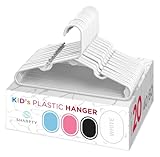
How you store the clothes is up to you. Most baby items are so small they don’t wrinkle easily, so folding is perfectly fine.
If you prefer to hang clothes, buy baby-sized hangers; adult hangers will stretch the necklines. We recommend tossing onesies, pajamas, and socks into drawer organizers and only hanging nicer outfits or jackets.
Make Your Life Easier
